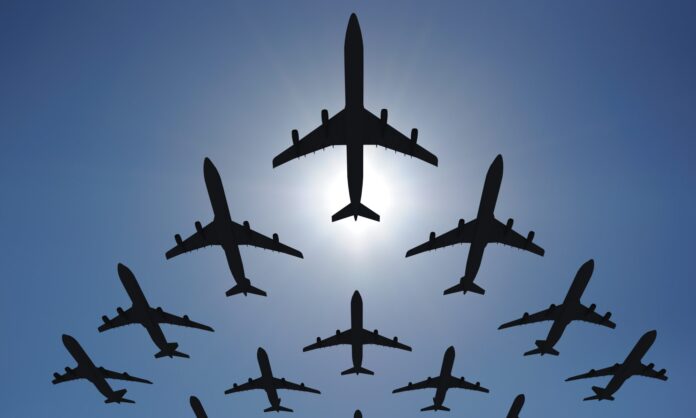
At least 70,000 jobs are at risk in the aviation industry and its supply chains over the next two to three months, according to new analysis in a paper from the New Economics Foundation (NEF) developed in collaboration with the TUC, aviation unions, and climate action charity Possible, published today. This figure is on par with scale of job losses in the coal industry in 1980-81.
Of the 70,000 jobs immediately at risk, 39,000 are in aviation, while the remaining number are likely to be lost in the supply chain. These figures are, however, unlikely to reflect the full extent of the job losses which could unfold by the end of the financial year. The report includes illustrative analysis of historical trends which suggests that without additional government intervention the aviation industry and its supply chains could ultimately seek to cut up to 124,000 jobs.
The report calls for a workers’ bailout for the aviation industry that uses the already established job retention scheme to support those in roles that are vulnerable due to the impacts of the Covid-19 crisis, automation, and the need to reduce carbon emissions. The proposed plan would ensure any bailouts given to airlines would support workers transitioning out of the sector, while reducing aviation emissions in line with the UK’s climate commitments.
The analysis shows that at least 17,000 workers in the sector will need to permanently transition out of employment in aviation. The analysis further shows that employment in the aviation sector is unlikely to ever return to pre-crisis levels with employment intensities in the sector falling consistently due to automation, technological development, and service cutbacks.
In 2014, seven years on from the previous financial crisis, passenger numbers had returned to their pre-crisis levels, but job numbers remained 17% lower. Since then, job numbers have only been sustained by rising passenger numbers. Over the past 20 years efficiency drives have reduced the job intensity of the sector and as a result, stagnation of the sector for the next five years would lead to at least a 12% decline in long-term job numbers, but potentially significantly more.
New analysis in the paper also shows that extending publicly subsidised loans to airlines adds to an existing pot of around £7bn a year in tax breaks handed by the Exchequer to airlines and their wealthy owners in the form of exemption from VAT and fuel tax (net of air passenger duty). As a result of the pandemic British Airways has recently received a £300m loan from the UK Government’s Coronavirus scheme, while EasyJet received £600m. In contrast, NEF analysis shows over the past five years the shareholders of BA’s parent company, IAG, extracted over £3.4bn in dividends and share buy-backs. BA has also already announced it intends to continue with cutting 12,000 jobs despite support from the job retention scheme.
As it is likely that the aviation sector businesses will be in need of further capital injection in coming months the report further calls for of a new bailout approach that puts social and environmental objectives at the heart of any new financial assistance scheme.
Polling carried out by YouGov for Possible found that there is little public support for providing airlines with bailouts without conditions attached to ensure that they protect their employees – it showed that just one in ten people (13%) thought that airlines should receive additional state financial support regardless of whether they make significant staff redundancies.
Alex Chapman, Researcher at the New Economics Foundation, said:
“The aviation industry faces job losses on a par with the worst years of the UK coal industry decline in the 1980s. We must take lessons from that period, and the financial crisis in 07/08 and do a better job of protecting the wellbeing of workers and communities. There are rock solid social and economic reasons for preventing the spike in unemployment which is being threatened by aviation bosses, and instead investing heavily in retraining and upskilling aviation workers to prepare them for a new normal, and the rapid decarbonisation of the UK economy.”
Alethea Warrington, campaigner at climate action charity Possible, said:
“At this time of crisis, we need to protect what really matters: people and the planet, not corporate profits. The terrible impacts of Covid-19 show that we need to change course to avoid worsening the storms of tomorrow. Airlines and airports must not be allowed to use public money to jeopardise the UK’s targets to avoid catastrophic levels of damage to the climate. Instead of providing a bailout for airline bosses, the government must provide a parachute for workers, supporting them through this crisis and where necessary into less environmentally damaging sectors. Any bailouts for aviation businesses must also be accompanied by new taxes and regulations across the sector, to ensure airlines have to cut their climate-crashing greenhouse gas emissions like everyone else .”
Frances O’Grady, General Secretary of the Trades Union Congress (TUC), said:
“Aviation is a critical part of our economic infrastructure and it supports tens of thousands of good jobs. The sector has already been hit hard by the Covid-19 pandemic and the implementation of the quarantine period is a further blow.
“We cannot consign these workers to the despair of unemployment.
“Aviation needs immediate support – and not just to protect the incomes of billionaire airline owners. Government must act now to protect workers’ jobs and livelihoods, to support the longer-term viability of the sector and to facilitate a just-transition to lower-carbon operations.”






